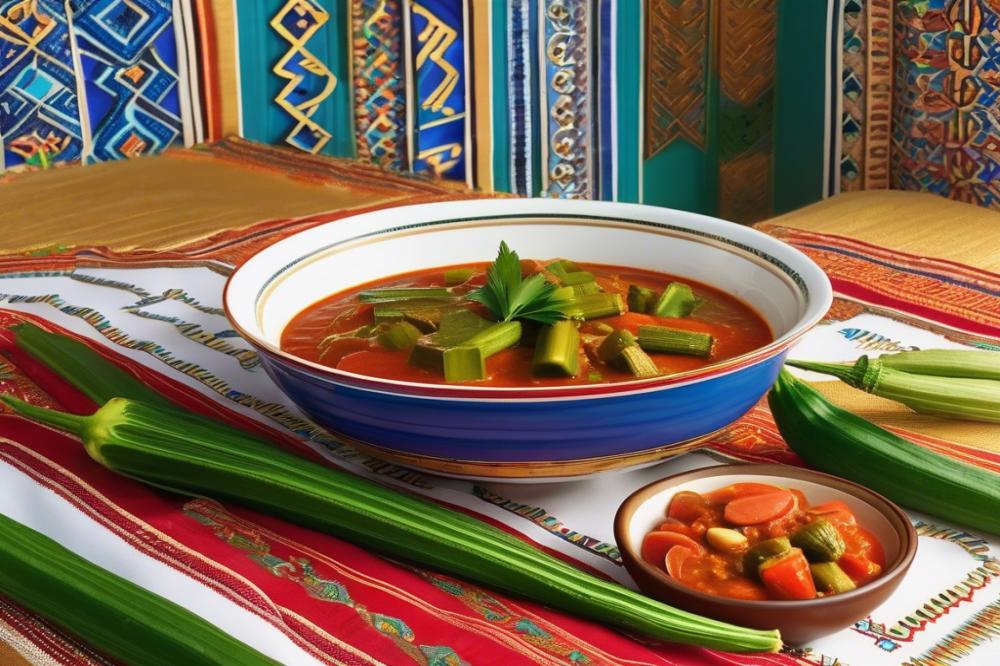The Secrets of Making Bamia Okra Stew Egyptian Style
Okra Stew holds a special place in the heart of Egyptian cuisine. This dish, often flavored with a variety of spices, offers a taste of tradition that many families enjoy. Rich in both flavor and history, it has become a staple on dinner tables across the country. Cultural dishes like this connect generations, and recipes are often passed down from mothers to daughters.
Exploring traditional recipes reveals much about the people who prepare them. Each ingredient tells a story, whether it’s the freshness of the vegetables or the distinct aromas wafting through the kitchen. In many households, making okra dishes is not just about feeding the family; it’s a celebration of community and heritage. Many enjoy gathering around the table for a hearty vegetarian stew that brings everyone together.
Okra is more than just a key ingredient; it’s also a nutritious powerhouse. This vegetable is packed with vitamins and minerals, making it a celebrated choice for healthy cooking. Incorporating okra into meals provides various health benefits while keeping dishes vibrant and flavorful. In fact, its unique texture and taste make it a favorite in Middle Eastern food.
Family meals become more than just a routine when dishes like this take center stage. They create connections and foster a sense of belonging. As everyone digs into a bowl of this delectable stew, conversations blossom and laughter fills the air. This is the magic of traditional recipes. They are not just about eating; they are about enjoying a shared experience.
Understanding Bamia
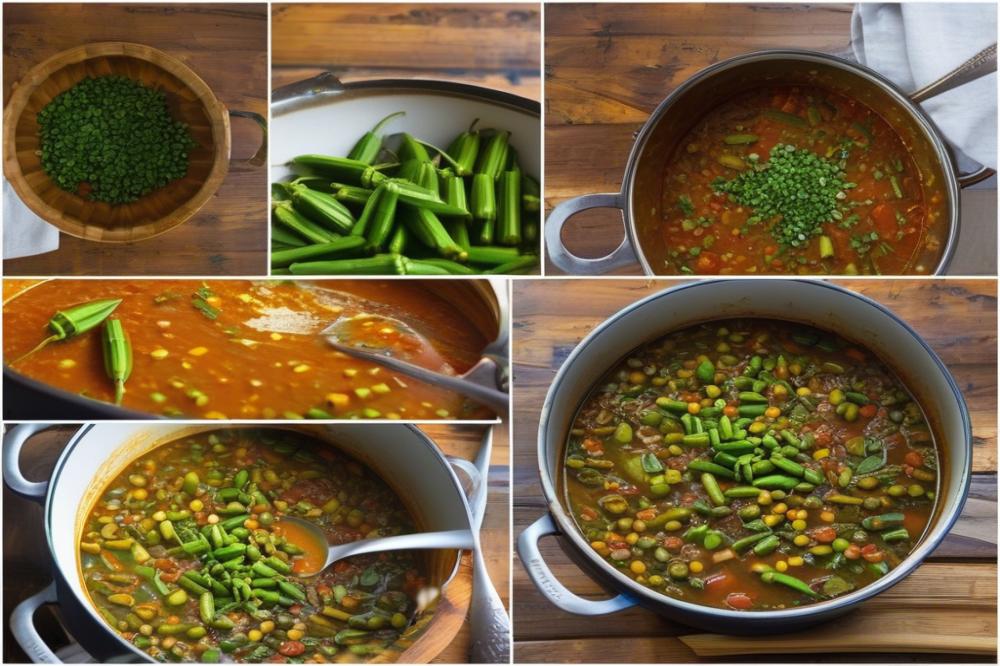
Bamia refers to a traditional Egyptian stew featuring okra as the central ingredient. This dish plays a significant role in Arabic food, especially in Egyptian cuisine. It exemplifies the rich flavors and textures found in many Middle Eastern recipes. With its combination of spices and fresh produce, it stands out as a favorite among many families.
Historically, okra has deep roots in Egyptian and Middle Eastern cuisine. It is believed that okra originated in Africa before spreading to the Mediterranean and beyond. This vegetable became popular due to its resilience in hot climates. Egyptian farmers have cultivated it for centuries, incorporating it into various dishes, especially stews. Its ability to create a thick, pleasant consistency has made it an essential ingredient in numerous traditional recipes across the region.
Variations of this vegetarian stew exist throughout Egypt and neighboring countries. In different regions, people may adjust the recipe by adding various spices or meats. Some prefer a tomato-based sauce, while others might lean towards a broth with a lighter flavor. Each family has its twist, showcasing the diversity of culinary styles in Middle Eastern food. This stew is not just a meal; it’s a way to bring families together for hearty dinners filled with warmth and rich flavors.
Ingredients and Cooking Instructions
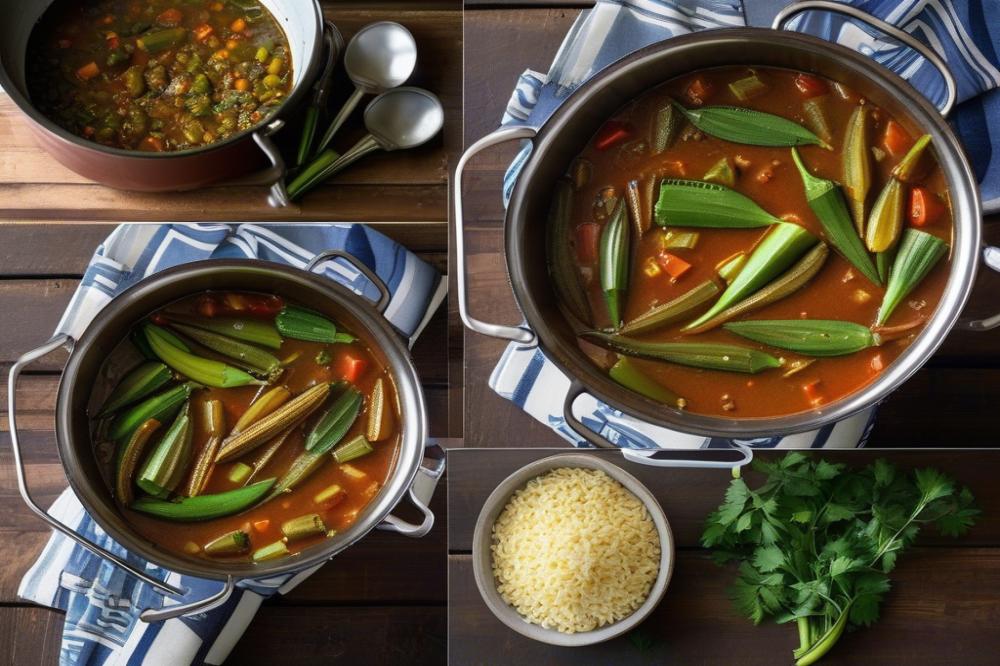
Detailed list of ingredients with quantities
- Fresh okra (500g)
- Olive oil (3 tablespoons)
- Onions (2 medium, chopped)
- Garlic (4 cloves, minced)
- Tomato paste (2 tablespoons)
- Fresh tomatoes (2 medium, diced)
- Vegetable broth (4 cups)
- Lemon juice (1 tablespoon)
- Cumin (1 teaspoon)
- Coriander (1 teaspoon)
- Salt and pepper (to taste)
- Optional: chili flakes (to taste)
Step-by-step cooking instructions
- Begin by heating the olive oil in a large pot. Sauté the chopped onions and minced garlic until softened and fragrant. This will create a flavorful base.
- Next, add the diced fresh tomatoes along with the tomato paste to the pot. Stir everything together, making sure the tomatoes break down.
- Incorporate the spices such as cumin and coriander. Continue cooking until the mixture becomes aromatic, filling your kitchen with delicious scents.
- Now it’s time to add the chopped okra and the vegetable broth. Bring it to a gentle simmer and cook until the okra is tender, which usually takes around 20 minutes.
- Before serving, taste the stew and adjust the seasoning with salt, pepper, and optional chili flakes for heat. Drizzle the lemon juice over the top for a bright finish.
Nutritional information
Understanding the nutritional aspects of this dish is helpful for healthy cooking. Each serving provides an array of benefits. Ingredients like okra contribute dietary fiber and vital vitamins. There are approximately 200 calories per serving, with modest amounts of protein and healthy fats from olive oil. The dish is rich in carbohydrates from the vegetables. This vegetarian stew is a great option for anyone wanting a satisfying meal without meat. Moreover, it’s packed with antioxidants and minerals that benefit your overall health.
The Cultural Significance of Bamia
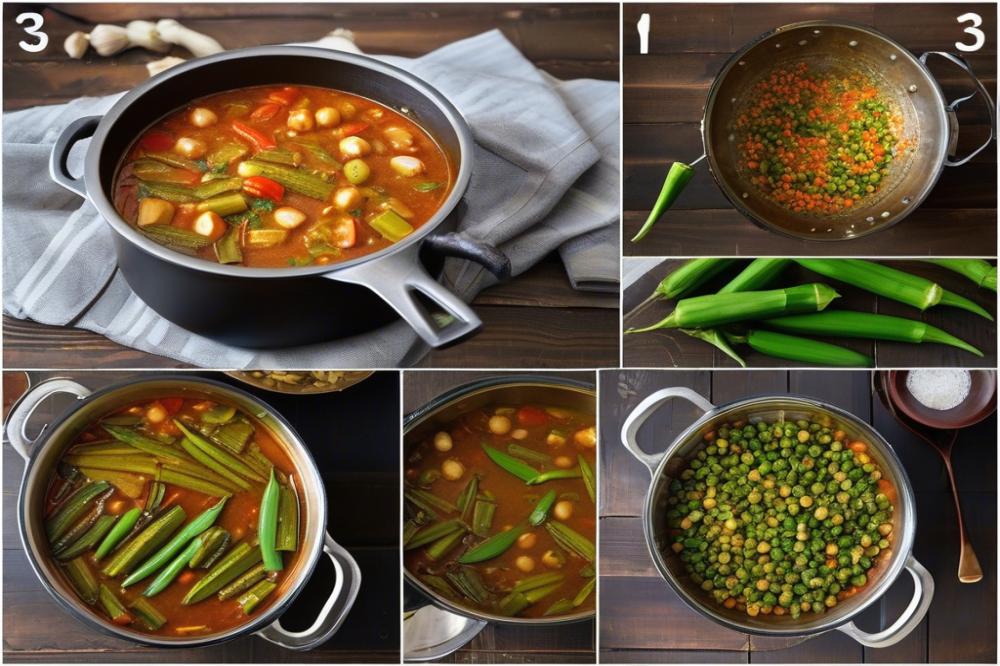
In Egyptian households, okra dishes hold a special place. Families often gather around the table to enjoy traditional recipes. This dish is adored for its rich flavors and health benefits. It showcases the heart of Egyptian cuisine, where taste and nutrition blend seamlessly.
Communal eating defines many cultural practices throughout Egypt. Family meals are important for building bonds and creating memories. Sharing food brings people together, making each meal a celebration. Many homes place a strong emphasis on serving vegetarian stews that offer warmth and comfort. Such meals reflect not just culinary traditions but also shared histories.
When exploring Middle Eastern food, one can see how cultural dishes often reflect local ingredients and spices. Okra is a staple in many Arab kitchens, emphasizing the diversity within Arabic food. Many families prepare these flavorful stews with a variety of herbs, creating unique taste experiences. This dish highlights the region’s love for blending flavors and textures.
Healthy cooking practices are significant in Egyptian culture. The emphasis on using fresh vegetables is evident in every bite. Evoking memories of home, these meals often inspire feelings of nostalgia. As different communities share their recipes, the importance of food as a connector becomes more apparent.
Overall, this favored dish does more than please the palate. It narrates stories of traditions passed down through generations. Eating together fosters relationships and cultivates a sense of belonging. In Egypt, okra dishes represent more than just sustenance; they signify warmth, unity, and a rich cultural heritage.
Health Benefits of Okra
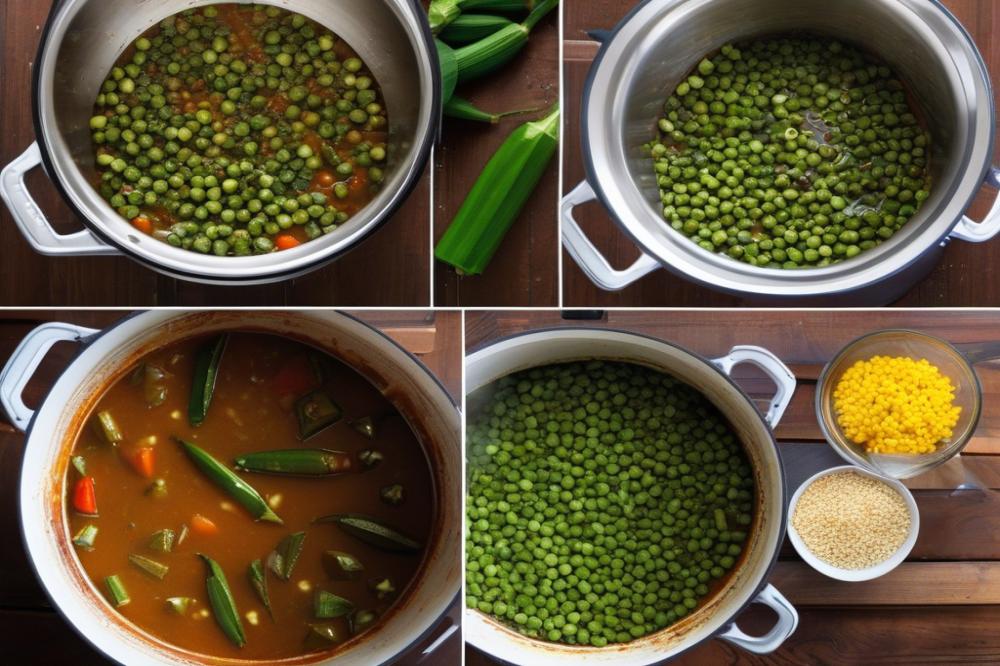
Okra, a staple in Egyptian cuisine, boasts a rich nutritional profile. This vegetable is low in calories and high in valuable nutrients. It contains essential vitamins such as A, C, and K. Minerals like magnesium and potassium are also present in significant amounts. Eating okra can contribute positively to overall health.
Dietary fiber is abundant in this vegetable. Fiber is known to aid digestion. It supports gut health and helps with regularity, making it an important part of a balanced diet. Okra can also help lower cholesterol levels, which is beneficial for heart health. Many traditional recipes highlight the vegetable’s role in promoting wellness.
This vegetarian stew is particularly noteworthy. It provides a wealth of nutrients without the excess calories found in some meat dishes. Additionally, the various spices used in the preparation add flavor while enhancing health benefits. Those who enjoy Middle Eastern food often appreciate the complex tastes and nutritious qualities it offers.
Vitamin C, found in okra, plays a critical role in boosting the immune system. Antioxidants in this vegetable help combat free radicals, thereby reducing inflammation. The combination of fiber, vitamins, and minerals makes okra dishes a smart choice for anyone focused on healthy cooking.
Families looking for nutritious meal options can find okra a versatile ingredient. It pairs well with other vegetables and protein sources. Cultural dishes like this vegetarian stew contribute to a diverse diet. Incorporating okra into regular meals supports good health and fosters a love for traditional flavors.
Variations and Serving Suggestions
Ways to Make or Serve the Stew
There are many interpretations of this classic dish in Egyptian cuisine. Some prefer to add meat, such as chicken or lamb, to create a rich and hearty flavor. Others stick strictly to a vegetarian stew, keeping the focus on the okra and spices. For a twist, one might include tomatoes or bell peppers, enhancing the dish’s color and taste. When it comes to spices, cumin and coriander remain popular choices, but experimenting with chili powder can give it an exciting kick.
Side Dishes and Accompaniments
Serving this stew with rice is a common practice. White rice allows the flavors to shine while providing a satisfying base. Another option is to serve it with soft pita bread. The bread can be used to scoop up the stew, making every bite enjoyable. Additionally, a simple salad made with cucumbers and tomatoes can add a refreshing crunch. These options make for a balanced meal, combining both protein and fiber, which is great for family meals.
Storing Leftovers and Meal Prepping Tips
Storing leftovers requires a few careful steps. Place cooled stew in airtight containers. This method keeps the dish fresh for up to three days in the fridge. If freezing, use freezer-safe bags or containers to avoid freezer burn. To reheat, warm it gently on the stove, adding a splash of water if it thickens too much. For meal prepping, consider preparing a large batch on the weekend. This approach allows quick meals throughout the week, fitting perfectly into a busy lifestyle. Either way, this approach to healthy cooking reflects both convenience and taste.
Bringing the Heart of Egyptian Cuisine Home
We’ve explored the wonderful world of okra stew and its place in Egyptian cuisine. This dish represents more than just a meal. It reflects the flavors and traditions of a rich culinary heritage. As people gather around the table to enjoy this savory stew, they also connect with their culture’s history and unique practices.
Trying your hand at making this stew can be a fulfilling experience. Being in the kitchen allows you to become part of a tradition that spans generations. You’ll likely find that the process is just as rewarding as the final dish. Gather your ingredients, follow the steps, and enjoy the aromas filling your home. A homemade meal can bring comfort and joy.
Final thoughts circle back to embracing traditional recipes and healthy cooking. Many dishes, like this one, offer a balanced approach to nutrition. Incorporating colored veggies, spices, and wholesome ingredients provides not only taste but also nutrition. Cultivating a habit of preparing these meals can make your everyday life more flavorful and satisfying.

